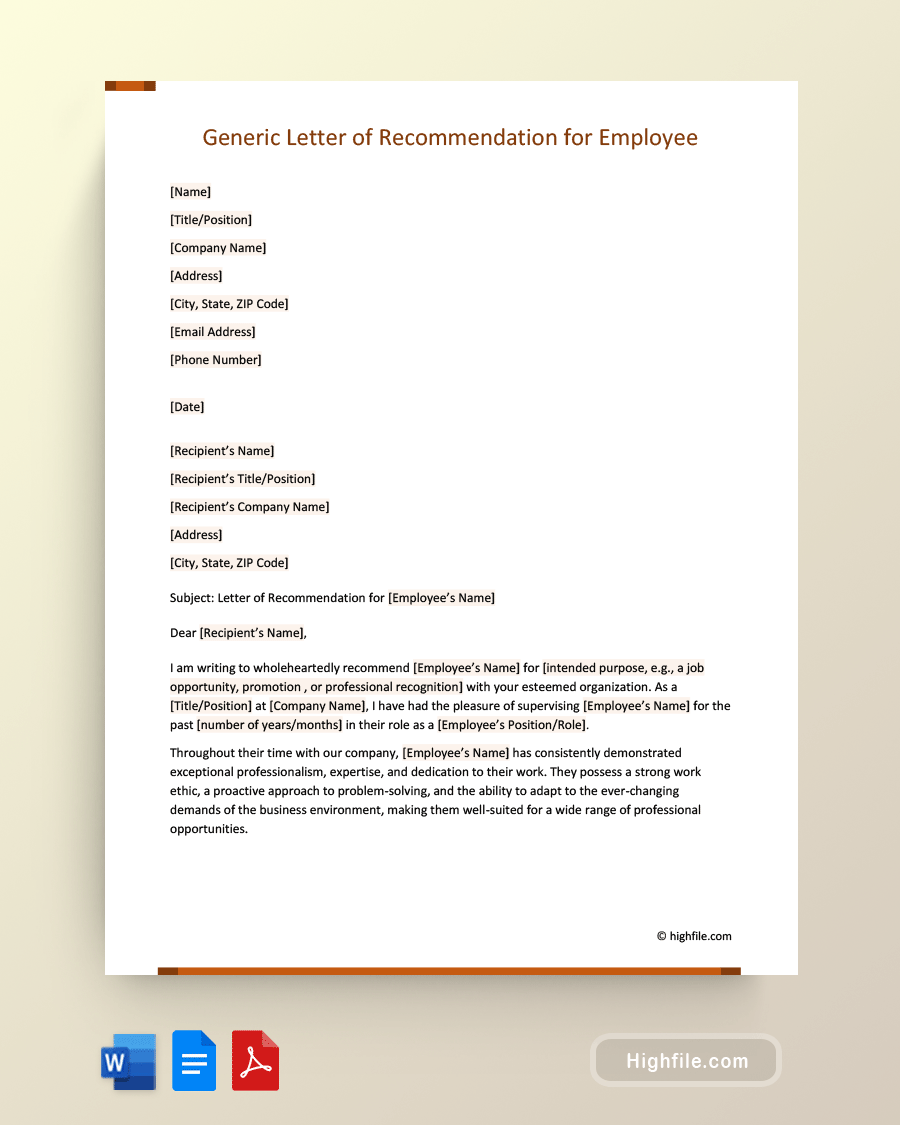A generic letter of recommendation for an employee provides a positive reference for the employee’s skills, achievements, and character. The employee can use it for multiple job applications or professional opportunities, as it is not targeted toward a specific job or academic program. The letter benefits the employee by showcasing their strengths and suitability for the job, which can increase their chances of getting hired or accepted. The writer can use a template to ensure that the letter follows a consistent format and includes all the necessary information while also saving time and effort. A template can also help the writer avoid common mistakes or omissions and ensure the letter is well-organized and professional-looking.
What Is a Generic Letter of Recommendation for an Employee?
A generic letter of recommendation for an employee is a letter that is written by someone who is familiar with the employee’s work, character, and achievements and who can provide a positive reference for them. It is called “generic” because it is not targeted towards a specific job or academic program but can be used by the employee for multiple job applications or professional opportunities. The letter typically highlights the employee’s strengths, accomplishments, and personal qualities that make them valuable in any workplace.
Fun Fact: This type of letter is often called a “To Whom It May Concern Letter” because the formal introduction is often used.
Why Is Generic Letter of Recommendation for an Employee Important?
A generic letter of recommendation for an employee is important for several reasons:
- Provides a Positive Reference: A well-written letter of recommendation can enhance the employee’s credibility and validate their skills and abilities.
- Demonstrates Value: The letter can highlight the employee’s contributions to the organization, which can be helpful in future job applications and career advancement.
- Serves as a Template: A generic letter of recommendation can be modified and reused for other employees, saving time and effort for managers and supervisors.
- Enhances Reputation: By providing positive references for employees, the organization can establish a reputation as a supportive and nurturing workplace.
- Builds Relationships: Writing a letter of recommendation can strengthen the relationship between the employee and the organization, increasing employee loyalty and engagement.
Pro Tip: Generic doesn’t mean the letter isn’t customized to the employee. Include measurable achievements and metrics. By providing concrete examples of the employee’s accomplishments, you can demonstrate their value to potential employers and differentiate them from other candidates. Use specific numbers, percentages, or other metrics to quantify the employee’s contributions, such as the amount of revenue they generated, the percentage increase in productivity they achieved, or the number of successful projects they completed. This will highlight the employee’s strengths and provide evidence of their ability to deliver results, which employers highly value.
Essential Elements of Generic Letter of Recommendation for Employee
The essential elements of a generic letter of recommendation for an employee include the following:
- Introduction: Begin by introducing yourself and your relationship with the employee, including your job title and how long you have worked together.
- Working Relationship: Describe the employee’s role and responsibilities within the organization.
- Character: Comment on the employee’s personal qualities and characteristics, such as integrity, honesty, and interpersonal skills.
- Performance and Reliability: Evaluate the employee’s job performance honestly, highlighting their positive qualities. Discuss their reliability, punctuality, and ability to meet deadlines.
- Comparison to Similar: Compare the employee’s performance and skills to others in similar roles, highlighting their unique strengths and contributions.
- Specific Examples: Provide specific examples of the employee’s accomplishments and contributions, including any projects or initiatives they have led or participated in.
- Endorsement: Endorse the employee’s qualifications and potential for future success, and express your confidence in their ability to excel in future endeavors. Give a formal recommendation statement, such as “I highly recommend [employee name] for any future employment opportunities.”
- Formal Closing: Let the reader know they can contact you for additional information. Close the letter with “Sincerely” and a handwritten signature.
- Contact Information: Include your contact information so potential employers can follow up with any questions or requests for additional information.
Sample Letter of Recommendation for Employee
[Name]
[Title/Position]
[Company Name]
[Address]
[City, State, ZIP Code]
[Email Address]
[Phone Number]
[Date]
[Recipient’s Name]
[Recipient’s Title/Position]
[Recipient’s Company Name]
[Address]
[City, State, ZIP Code]
Subject: Letter of Recommendation for [Employee’s Name]
Dear [Recipient’s Name],
I am writing to wholeheartedly recommend [Employee’s Name] for [intended purpose, e.g., a job opportunity, promotion , or professional recognition] with your esteemed organization. As a [Title/Position] at [Company Name], I have had the pleasure of supervising [Employee’s Name] for the past [number of years/months] in their role as a [Employee’s Position/Role].
Throughout their time with our company, [Employee’s Name] has consistently demonstrated exceptional professionalism, expertise, and dedication to their work. They possess a strong work ethic, a proactive approach to problem-solving, and the ability to adapt to the ever-changing demands of the business environment, making them well-suited for a wide range of professional opportunities.
[Employee’s Name] has shown exceptional skill in [list relevant skills or areas of expertise, e.g., project management, problem-solving, or communication], consistently delivering high-quality results under tight deadlines. Their ability to effectively manage multiple tasks simultaneously and work both independently and as part of a team makes them an invaluable asset to any organization.
In addition to their technical skills and expertise, [Employee’s Name] is a highly effective communicator, both in writing and verbally. They are able to articulate complex ideas clearly and concisely, and their ability to engage in thoughtful discussion and debate has greatly contributed to the success of our team and our projects.
[If applicable] [Employee’s Name] has also demonstrated strong leadership abilities and a commitment to fostering a positive and inclusive work environment. They have effectively mentored and supported junior colleagues, sharing their knowledge and expertise to contribute to the overall growth and development of our team.
In summary, I am confident that [Employee’s Name] possesses the skills, experience, and drive necessary to excel in [intended purpose] and to make a meaningful contribution to your organization. I wholeheartedly endorse their candidacy and believe that they would be an invaluable addition to your team. Should you require any additional information or have any questions, please do not hesitate to contact me.
Sincerely,
[Name]
[Title/Position]
[Company Name]
FAQs
To ensure that your generic letter of recommendation is legally compliant and free of discriminatory language, you should:
ᐅ Use objective and factual language to describe the employee’s skills, abilities, and achievements.
ᐅ Avoid making assumptions or generalizations about the employee based on race, gender, age, religion, or other protected characteristics.
ᐅ Refrain from using stereotypes or biased language that could be interpreted as discriminatory.
ᐅ Focus on the employee’s qualifications and suitability for the job rather than personal characteristics or traits.
ᐅ Avoid making negative comments or criticisms that could be seen as defamatory or discriminatory.
ᐅ Use inclusive language that does not exclude any particular group or individual.
ᐅ Ensure your letter is consistent with your organization’s policies and procedures regarding equal employment opportunities and non-discrimination.
ᐅ Seek legal advice or guidance if you are unsure about the legal implications of your letter or the language you are using.
Some best practices for writing a generic letter of recommendation that is effective and informative are:
ᐅ Start by introducing yourself and your relationship with the employee, including the duration and nature of your association.
ᐅ Clearly state the purpose of the letter and the context in which it will be used.
ᐅ Highlight the employee’s strengths, accomplishments, and unique qualities that make them stand out from others.
ᐅ Use specific examples to illustrate the employee’s achievements and capabilities, and quantify their contributions whenever possible.
ᐅ Provide a balanced assessment of the employee’s strengths and weaknesses while emphasizing their potential and suitability for the job or opportunity.
ᐅ Customize the letter to the particular requirements of the job or program while retaining its generic character and usefulness.
ᐅ Use professional language appropriate for the context and the recipient, and avoid jargon or technical terms that may be unfamiliar to the reader.
ᐅ Conclude by summarizing your key points and reiterating your endorsement of the employee’s candidacy.
ᐅ Provide your contact information and availability for further follow-up or inquiries.
ᐅ Proofread your letter carefully for errors and ensure it is well-organized, concise, and visually appealing.
A generic letter of recommendation can be used for different types of job applications or industries because it focuses on the employee’s overall performance, character, and achievements rather than specific job requirements or industry standards. As long as the letter provides an accurate and positive assessment of the employee’s qualifications and suitability for the job, it can be used as a general reference for various employment opportunities. When possible, ensure that the letter is customized to the particular job or industry to increase its relevance and impact.
Key Points
A generic Letter of Recommendation for an Employee is a document composed by an individual who has first-hand knowledge of the employee’s performance, personality, and accomplishments and can offer a favorable assessment of them. This type of letter is known as “generic” because it is not tailored to a specific job or academic program but can be utilized by the employee for various job applications or professional endeavors. The letter emphasizes the employee’s strong points, achievements, and personal attributes, making them a valuable addition to any organization.







